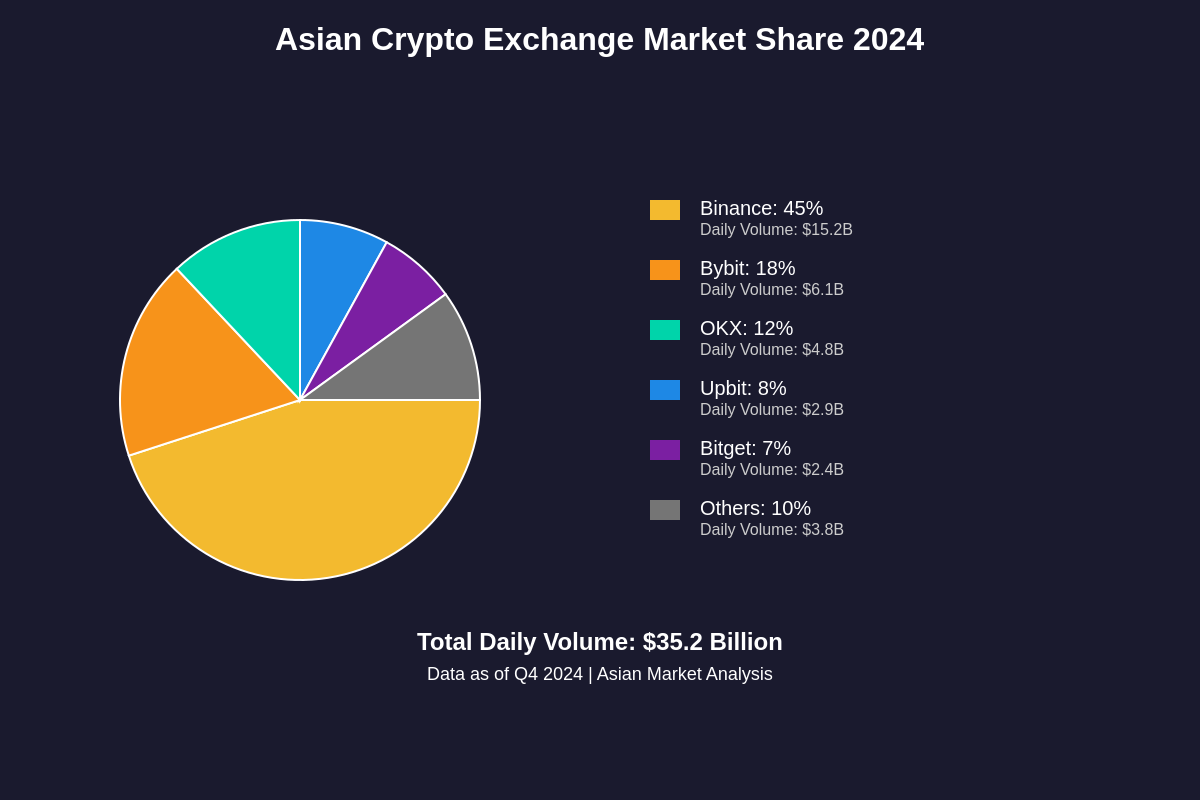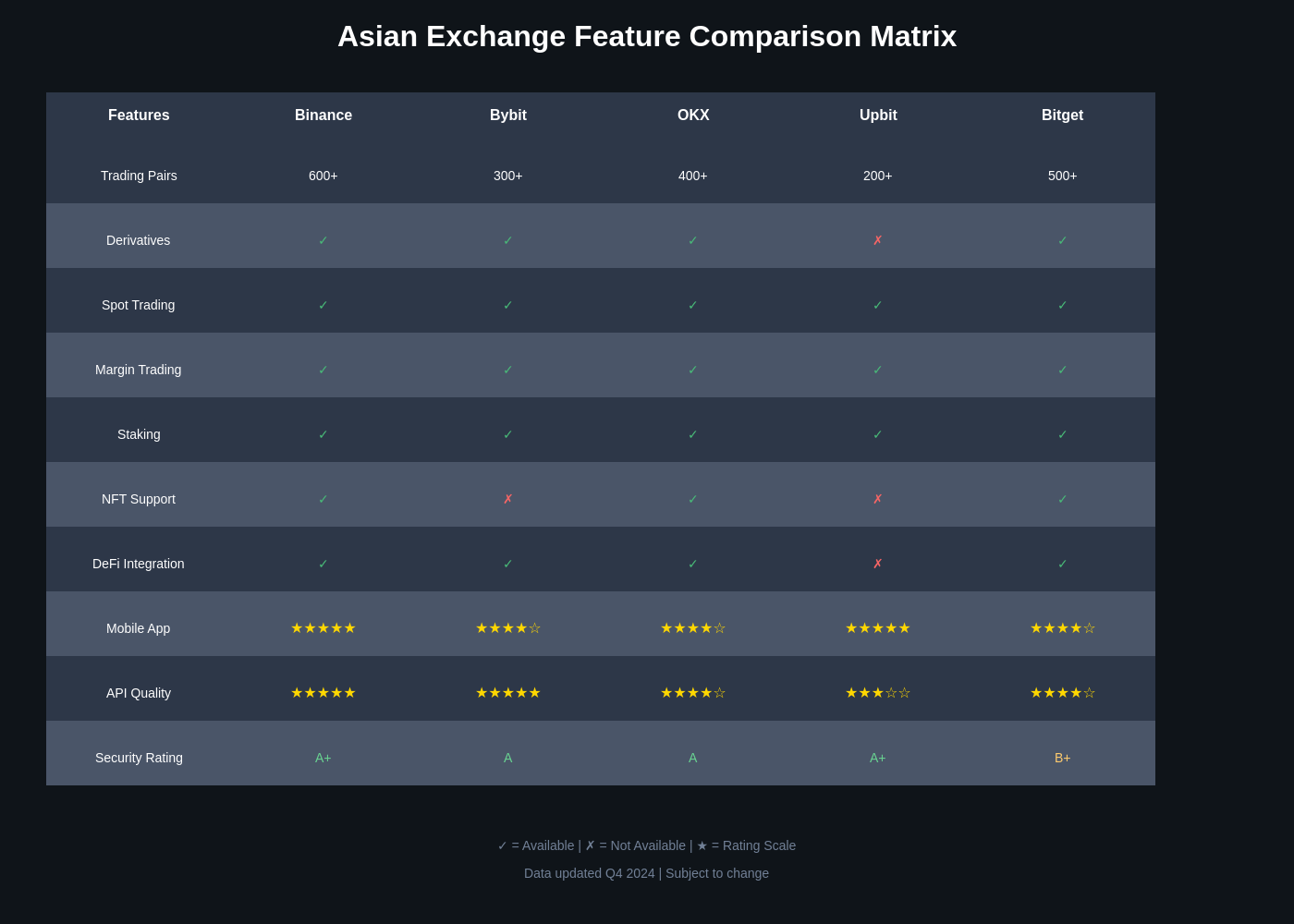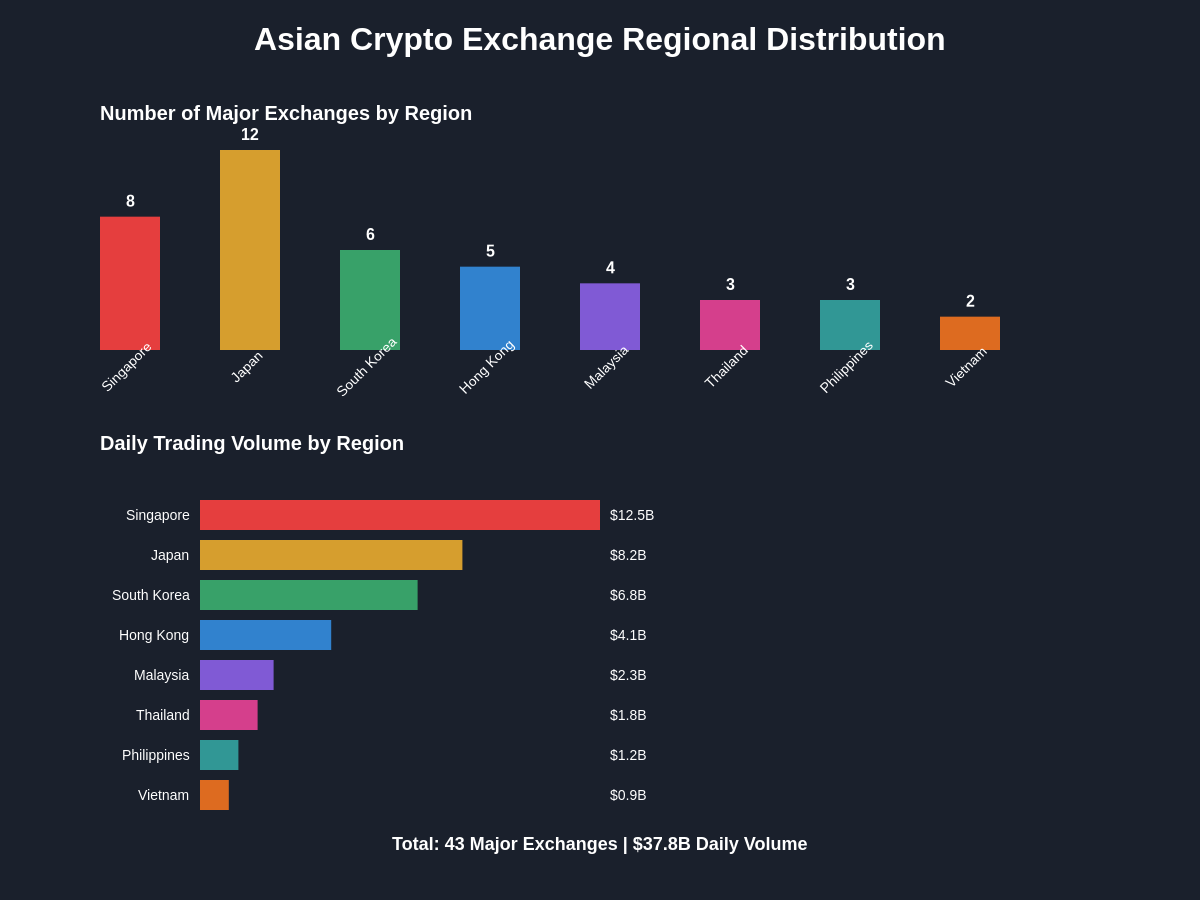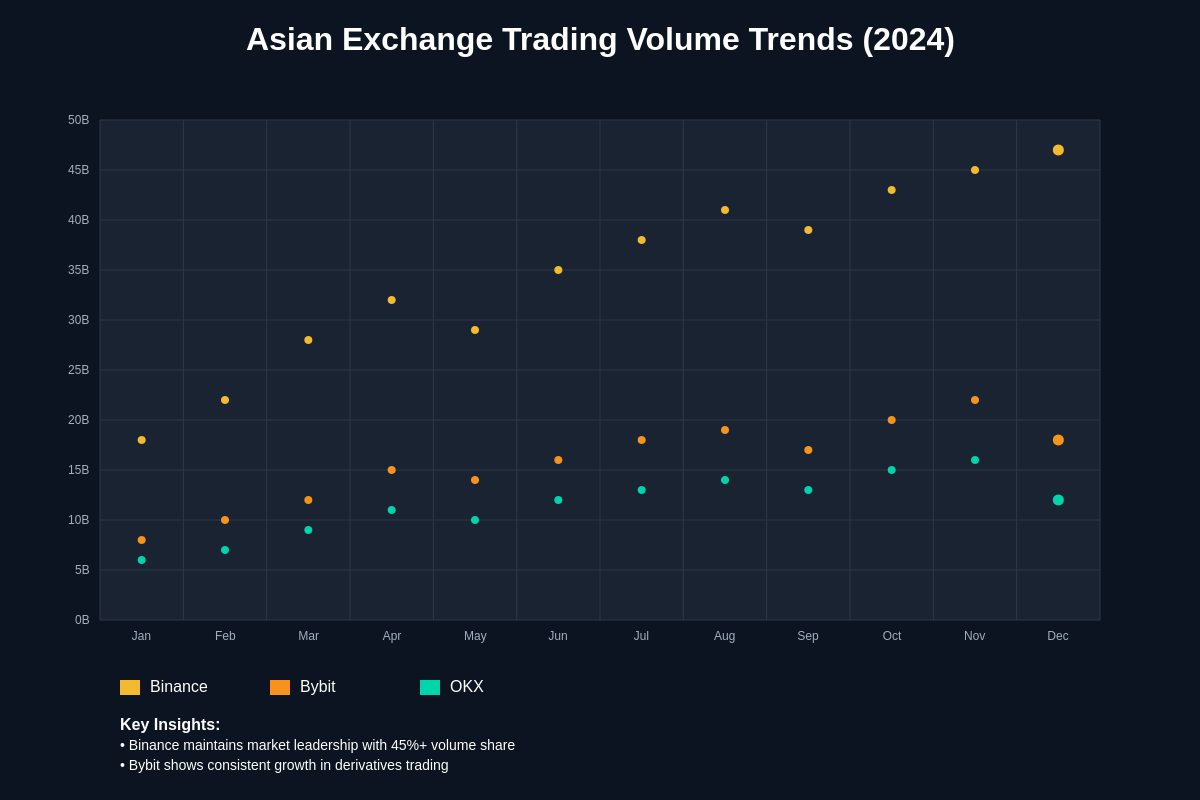TradingView Pine Script Reference
The Asian Cryptocurrency Exchange Ecosystem
Asia has emerged as the undisputed global leader in cryptocurrency trading, hosting the world’s largest and most influential exchanges while driving innovation in digital asset infrastructure, trading technologies, and financial products. The Asian cryptocurrency exchange ecosystem represents a complex network of established global giants, regional powerhouses, and emerging platforms that collectively process trillions of dollars in trading volume annually while serving diverse markets across the continent’s rapidly evolving digital economy.

The dominance of Asian exchanges stems from a combination of factors including early adoption of cryptocurrency technologies, favorable regulatory environments in key jurisdictions, sophisticated trading infrastructure, and deep integration with traditional financial systems. Major exchanges like Binance, which originated in China before expanding globally, and Singapore-based platforms have leveraged Asia’s technological expertise and capital markets experience to build platforms that serve both retail and institutional investors worldwide.
The regulatory landscape across Asia varies dramatically from jurisdiction to jurisdiction, with some countries like Singapore and Japan establishing comprehensive frameworks that have attracted major exchanges, while others have implemented restrictions that have forced platforms to relocate or adapt their business models. This regulatory diversity has created a dynamic ecosystem where exchanges must navigate complex compliance requirements while competing for market share across multiple jurisdictions.
Binance: The Global Exchange Giant
Binance has established itself as the world’s largest cryptocurrency exchange by trading volume, processing over $10 billion in daily transactions while offering one of the most comprehensive suites of cryptocurrency services available anywhere in the industry. Founded by Changpeng Zhao in 2017, Binance has grown from a startup to a global financial infrastructure provider that serves over 150 million users across more than 180 countries and territories.
The exchange’s success stems from its aggressive expansion strategy, innovative product development, and ability to adapt quickly to changing market conditions and regulatory requirements. Binance’s trading engine can process over 1.4 million orders per second, making it one of the most technically sophisticated platforms in the cryptocurrency industry. The platform supports spot trading, futures trading, options, margin trading, and a wide range of financial products including savings accounts, lending services, and staking programs.
Binance’s global expansion has been facilitated by its localization strategy, which involves establishing regional operations, obtaining local licenses, and adapting products to meet local regulatory requirements and market preferences. The exchange operates separate platforms in different jurisdictions, including Binance.US for American users and various regional platforms that comply with local regulations while maintaining integration with the broader Binance ecosystem.
The platform’s native token, BNB, has become one of the largest cryptocurrencies by market capitalization and serves multiple functions within the Binance ecosystem including trading fee discounts, participation in token sales, and payment for various services. Binance’s token economics and utility integration have created a self-reinforcing ecosystem that benefits from network effects as more users and services join the platform.

Binance’s institutional services include advanced trading interfaces, API access for algorithmic trading, custody solutions, and over-the-counter trading desks that serve large-scale investors and professional trading firms. The exchange has also expanded into blockchain infrastructure through Binance Smart Chain and other initiatives that position it as a comprehensive blockchain ecosystem rather than just a trading platform.
Bybit: The Derivatives Trading Specialist
Bybit has established itself as one of the leading cryptocurrency derivatives exchanges globally, specializing in perpetual futures contracts and advanced trading products that cater to professional traders and sophisticated retail investors. Founded in 2018 and headquartered in Singapore, Bybit has rapidly grown to become one of the top exchanges by derivatives trading volume, processing billions of dollars in daily transactions across its various trading products.
The exchange’s focus on derivatives trading has allowed it to build specialized infrastructure and trading tools that are optimized for high-frequency trading, leverage trading, and risk management. Bybit’s trading engine is designed to handle large-scale derivatives trading with minimal latency and maximum reliability, featuring sophisticated order matching algorithms and risk management systems that protect both the exchange and its users from market volatility and extreme price movements.
Bybit’s product suite includes perpetual futures contracts for major cryptocurrencies, inverse and linear contracts with leverage up to 100x, and various structured products that appeal to different trading strategies and risk profiles. The platform has also expanded into spot trading while maintaining its core focus on derivatives, creating a comprehensive trading environment that serves both spot and derivatives traders within a single ecosystem.
The exchange’s approach to risk management includes dynamic funding rates, insurance funds, and sophisticated liquidation mechanisms that help maintain market stability even during periods of extreme volatility. Bybit’s trading analytics and market data are widely regarded as among the most accurate and comprehensive in the industry, providing traders with the information they need to make informed decisions in volatile cryptocurrency markets.
Bybit has also invested heavily in institutional services, offering dedicated account management, customized trading solutions, and advanced API access that enables institutional clients to integrate Bybit’s liquidity and trading capabilities into their own systems. The platform’s institutional focus has helped it attract hedge funds, trading firms, and other professional investors who require sophisticated trading infrastructure and reliable execution.
Regional Exchange Powerhouses
Beyond the global giants, Asia hosts numerous regional exchanges that serve specific markets and communities while offering unique features and services tailored to local needs and preferences. These regional platforms often possess deep understanding of local regulations, customer preferences, and market dynamics that enable them to compete effectively against larger international competitors.
Japan’s cryptocurrency exchange market is dominated by platforms like bitFlyer, Coincheck, and BitBank, which operate under the country’s comprehensive cryptocurrency regulations and serve one of the world’s most sophisticated cryptocurrency user bases. Japanese exchanges are known for their emphasis on security, regulatory compliance, and user protection, reflecting the country’s cautious but supportive approach to cryptocurrency adoption.
South Korea’s exchange ecosystem includes major platforms like Upbit, Bithumb, and Coinone, which serve a highly active trading community and offer integration with the country’s advanced digital payment infrastructure. Korean exchanges have pioneered various trading features and user experience innovations while navigating the country’s evolving regulatory framework for digital assets.
India’s cryptocurrency market, despite regulatory uncertainty, has produced exchanges like CoinDCX, WazirX, and ZebPay that serve a rapidly growing user base and offer localized services including rupee trading pairs and integration with local payment systems. These platforms have demonstrated resilience in navigating regulatory challenges while building sustainable businesses in one of the world’s largest potential cryptocurrency markets.
Southeast Asian exchanges including those in Thailand, Malaysia, Vietnam, and the Philippines have grown rapidly as cryptocurrency adoption increases across the region. These platforms often focus on fiat gateway services, local payment integration, and educational resources that help onboard new users to cryptocurrency trading and investment.

Trading Infrastructure and Technology
The technological infrastructure that powers Asian cryptocurrency exchanges represents some of the most advanced financial technology in the world, incorporating sophisticated matching engines, risk management systems, and scalability solutions that enable these platforms to handle massive trading volumes while maintaining reliability and security.
Modern exchange matching engines utilize advanced algorithms and high-performance computing systems to process millions of orders per second while ensuring fair and efficient price discovery. These systems must handle various order types, implement complex trading rules, and maintain consistency across multiple trading pairs and financial products simultaneously.
Cloud computing and distributed architecture have become essential components of exchange infrastructure, enabling platforms to scale dynamically based on trading demand while maintaining redundancy and disaster recovery capabilities. Leading exchanges utilize multi-region deployments, content delivery networks, and advanced caching systems to minimize latency and ensure reliable access for users worldwide.
Security infrastructure includes advanced encryption, multi-signature wallet systems, hardware security modules, and sophisticated monitoring systems that protect user funds and detect suspicious activities. The most advanced exchanges implement zero-trust security models, regular security audits, and bug bounty programs that help identify and address potential vulnerabilities before they can be exploited.
API infrastructure has become increasingly important as institutional clients and algorithmic traders require programmatic access to exchange services. Modern exchanges offer REST and WebSocket APIs that provide real-time market data, order execution capabilities, and account management functions that enable sophisticated trading strategies and automated systems.
Regulatory Landscape and Compliance
The regulatory environment for cryptocurrency exchanges across Asia varies significantly from jurisdiction to jurisdiction, creating a complex compliance landscape that exchanges must navigate while operating across multiple markets and serving diverse user bases. This regulatory diversity has both challenges and opportunities for exchanges seeking to expand their operations across the region.
Singapore has emerged as a leading jurisdiction for cryptocurrency exchanges, offering a comprehensive regulatory framework through the Monetary Authority of Singapore that provides clarity for exchanges while ensuring consumer protection and financial stability. The Payment Services Act requires exchanges to obtain licenses and comply with anti-money laundering requirements, risk management standards, and operational resilience requirements.
Japan’s Virtual Currency Act and related regulations have created one of the world’s most comprehensive regulatory frameworks for cryptocurrency exchanges, requiring platforms to obtain licenses, maintain segregated customer funds, implement robust security measures, and comply with detailed operational requirements. This regulatory approach has contributed to high levels of consumer confidence in Japanese exchanges while setting global standards for exchange regulation.
Hong Kong’s regulatory approach has evolved significantly, with the Securities and Futures Commission introducing licensing requirements for exchanges that trade security tokens while allowing qualified investors to access cryptocurrency trading services. The territory’s position as a major financial center has attracted exchanges seeking to serve institutional clients and connect Asian and global markets.
Regulatory uncertainty in some jurisdictions has forced exchanges to adapt their business models, relocate operations, or implement geographic restrictions to ensure compliance with local laws. These challenges have driven innovation in compliance technology and encouraged exchanges to develop more sophisticated approaches to regulatory risk management.
Market Dynamics and Competition
The competitive landscape among Asian cryptocurrency exchanges is characterized by intense competition for market share, continuous innovation in products and services, and aggressive expansion strategies that have reshaped the global cryptocurrency trading ecosystem. This competition has benefited users through lower fees, better services, and more sophisticated trading products.
Trading volume competition has driven exchanges to implement competitive fee structures, including zero-fee trading for certain products, maker-taker models that incentivize liquidity provision, and volume-based discount programs that reward high-frequency traders. Some exchanges have also introduced revenue-sharing programs and token-based incentive systems that align user interests with platform success.
Product innovation has become a key differentiator, with exchanges constantly developing new trading products, financial services, and blockchain-based solutions to attract and retain users. This innovation includes derivatives products, structured products, DeFi integration, NFT marketplaces, and various yield-generating products that appeal to different types of investors.
User acquisition strategies include aggressive marketing campaigns, referral programs, educational initiatives, and partnerships with influencers and content creators. Leading exchanges invest heavily in brand building and community development to establish trust and loyalty among their user bases.
Geographic expansion has become increasingly important as exchanges seek to access new markets and diversify their revenue streams. This expansion often involves establishing local operations, obtaining regulatory licenses, and adapting products to meet local market requirements and cultural preferences.
Institutional Services and Professional Trading
The evolution of Asian cryptocurrency exchanges toward serving institutional clients has transformed the industry from primarily retail-focused platforms to sophisticated financial infrastructure providers that can compete with traditional financial markets. This institutional focus has driven improvements in technology, compliance, and service quality that benefit all types of users.
Prime brokerage services offered by leading exchanges include multi-exchange connectivity, portfolio management tools, risk management systems, and credit facilities that enable institutional clients to trade across multiple venues while managing their exposures through a single platform. These services are essential for hedge funds, family offices, and other institutional investors who require sophisticated trading capabilities.
Custody solutions have become increasingly important as institutional clients require secure storage for large cryptocurrency holdings with appropriate insurance coverage, audit trails, and regulatory compliance. Leading exchanges offer both hot and cold storage options with various security features including multi-signature requirements, geographic distribution, and offline storage capabilities.
Over-the-counter trading desks serve institutional clients who need to execute large transactions without impacting market prices. These services include block trading, algorithmic execution, and customized settlement arrangements that accommodate the specific needs of institutional investors while providing access to deep liquidity pools.
API connectivity and system integration capabilities enable institutional clients to connect their own trading systems, risk management platforms, and portfolio management tools to exchange infrastructure. This connectivity is essential for algorithmic trading, automated portfolio management, and integration with existing institutional workflows.
Innovation and Future Technologies
Asian cryptocurrency exchanges are at the forefront of innovation in blockchain technology, financial products, and trading infrastructure, driving developments that influence the global cryptocurrency ecosystem and shape the future of digital asset trading. This innovation spans multiple areas including blockchain integration, artificial intelligence, and advanced financial engineering.
Blockchain technology integration includes the development of native blockchains, layer-2 scaling solutions, and cross-chain interoperability features that enhance the functionality and efficiency of exchange operations. Some exchanges have launched their own blockchain networks that offer faster transaction processing, lower costs, and enhanced functionality compared to traditional blockchain platforms.
Artificial intelligence and machine learning applications include fraud detection systems, market making algorithms, risk management tools, and personalized user experiences that improve security and trading efficiency. Advanced analytics and predictive modeling help exchanges optimize their operations while providing users with better trading tools and market insights.
Decentralized finance integration has become increasingly important as exchanges seek to bridge centralized and decentralized trading while offering users access to DeFi protocols and yield-generating opportunities. This integration includes DeFi staking services, automated market making, and liquidity mining programs that generate additional revenue for users.
Security innovations include advanced authentication systems, behavioral analysis, zero-knowledge proof implementations, and quantum-resistant encryption that protect user funds and personal information against evolving threats. Leading exchanges invest heavily in security research and development to stay ahead of potential vulnerabilities and attack vectors.
Economic Impact and Market Influence
The economic impact of Asian cryptocurrency exchanges extends far beyond their direct trading operations to influence global cryptocurrency markets, blockchain development, and the broader digital economy. These platforms have become essential infrastructure for the global cryptocurrency ecosystem while generating significant economic activity and employment across the region.
Market liquidity provision by major Asian exchanges influences global cryptocurrency prices and trading patterns, with these platforms often serving as primary price discovery mechanisms for major cryptocurrencies. The concentration of trading volume on Asian exchanges means that market movements and trading patterns in Asia can have global implications for cryptocurrency markets.
Innovation diffusion from Asian exchanges has influenced global cryptocurrency industry standards, trading practices, and technological development. Features and products pioneered by Asian exchanges are often adopted by platforms worldwide, making these exchanges important drivers of industry evolution and best practices.
Economic development in various Asian countries has been influenced by cryptocurrency exchange operations, which have created high-skilled employment opportunities, attracted foreign investment, and contributed to the development of fintech ecosystems. Countries that have embraced cryptocurrency exchanges have often seen broader benefits in terms of blockchain industry development and digital innovation.
Financial inclusion initiatives by some exchanges have helped bring cryptocurrency access to underserved populations across Asia, providing alternative financial services and investment opportunities that may not be available through traditional banking systems. These initiatives demonstrate the potential for cryptocurrency exchanges to contribute to broader economic development and financial democratization.
TradingView Market Analysis Tools
Risk Management and Security Practices
The security practices and risk management systems implemented by Asian cryptocurrency exchanges have evolved significantly in response to the growing sophistication of cyber threats and the increasing value of assets under management. These practices represent some of the most advanced security implementations in the financial technology sector.
Multi-layered security architectures include network security, application security, and infrastructure security measures that protect against various types of attacks. These systems utilize firewalls, intrusion detection systems, advanced encryption, and behavioral analysis to identify and prevent security threats before they can impact exchange operations or user funds.
Fund protection mechanisms include cold storage systems, multi-signature wallet implementations, insurance coverage, and reserve funds that protect user assets against various types of losses. Leading exchanges maintain the majority of user funds in offline storage systems while implementing sophisticated procedures for fund movement and access control.
Operational risk management includes business continuity planning, disaster recovery procedures, and redundant systems that ensure exchanges can continue operating even during major disruptions. These systems are essential for maintaining user confidence and ensuring that trading can continue during periods of high market volatility or technical challenges.
Compliance and monitoring systems help exchanges detect and prevent money laundering, fraud, and other illegal activities while ensuring compliance with applicable regulations. These systems utilize advanced analytics, transaction monitoring, and know-your-customer procedures to identify suspicious activities and ensure regulatory compliance across multiple jurisdictions.
User Experience and Accessibility
The user experience provided by Asian cryptocurrency exchanges has become increasingly sophisticated, with platforms investing heavily in interface design, mobile applications, and educational resources that make cryptocurrency trading accessible to users with varying levels of technical expertise and trading experience.
Mobile trading applications have become essential platforms for cryptocurrency trading, with leading exchanges developing native mobile apps that provide full trading functionality, real-time market data, and account management capabilities. These applications often incorporate advanced features including biometric authentication, push notifications, and offline capabilities that enhance security and usability.
Educational resources and market analysis tools help users understand cryptocurrency markets and make informed trading decisions. These resources include market research, technical analysis tools, trading tutorials, and webinars that provide valuable information for both novice and experienced traders.
Customer support systems include 24/7 live chat, multilingual support, and comprehensive help documentation that assists users with technical issues, trading questions, and account management. Leading exchanges maintain dedicated support teams and invest in support technology to ensure users receive timely and effective assistance.
Localization efforts include support for local languages, currencies, and payment methods that make exchanges accessible to users across different countries and regions. This localization is essential for serving diverse Asian markets and ensuring that users can effectively navigate and utilize exchange services.
Future Outlook and Industry Trends
The future of Asian cryptocurrency exchanges will be shaped by continuing technological innovation, evolving regulatory frameworks, increasing institutional adoption, and the broader development of the global cryptocurrency ecosystem. These trends suggest continued growth and evolution in the exchange landscape across Asia.
Regulatory clarity in key jurisdictions is expected to drive further institutional adoption and mainstream acceptance of cryptocurrency trading, leading to increased trading volumes and more sophisticated financial products. Clear regulatory frameworks will also enable exchanges to develop new services and expand their operations with greater confidence.
Technological advancement including blockchain scaling solutions, artificial intelligence integration, and enhanced security systems will continue to improve exchange performance and capabilities. These developments will enable exchanges to handle larger trading volumes while providing better user experiences and more sophisticated trading tools.
Integration with traditional financial systems is expected to accelerate as cryptocurrency exchanges develop partnerships with banks, payment providers, and other financial institutions. This integration will make cryptocurrency trading more accessible while enabling new use cases and applications for digital assets.
Global expansion by Asian exchanges will continue as these platforms leverage their technological expertise and capital resources to enter new markets and serve international users. This expansion will contribute to the global development of cryptocurrency infrastructure while increasing competition and innovation in the industry.

The emergence of central bank digital currencies and stablecoins will create new opportunities and challenges for cryptocurrency exchanges as they adapt their platforms to support these new types of digital assets. Exchanges that successfully integrate CBDCs and stablecoins into their offerings will be well-positioned to benefit from the continued evolution of digital money.
Disclaimer: This article is for informational purposes only and does not constitute financial advice. Cryptocurrency trading involves significant risks, including the potential for substantial losses. Past performance does not guarantee future results. Always conduct your own research and consider consulting with a qualified financial advisor before making investment decisions. The regulatory status of cryptocurrencies varies by jurisdiction and may change over time.